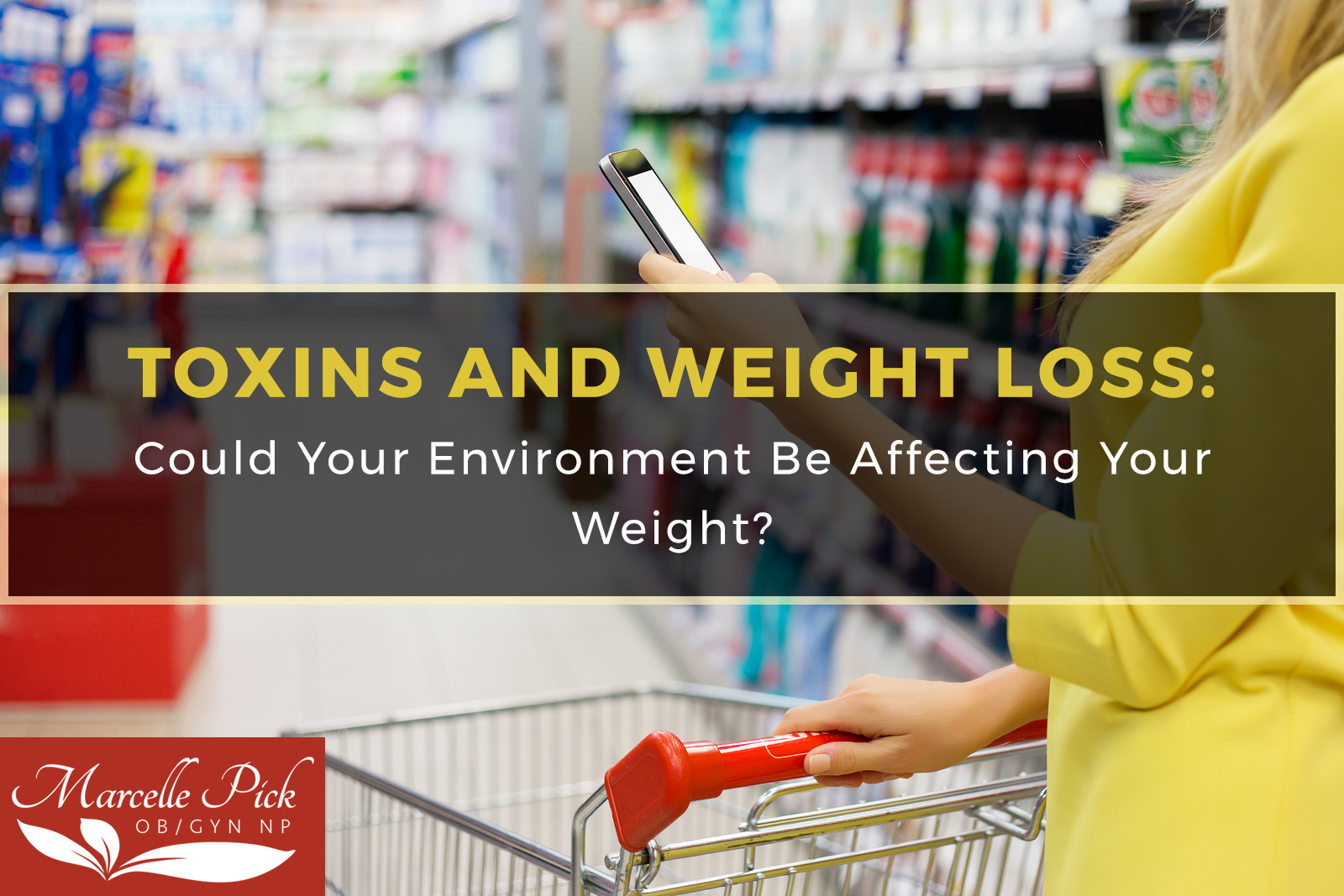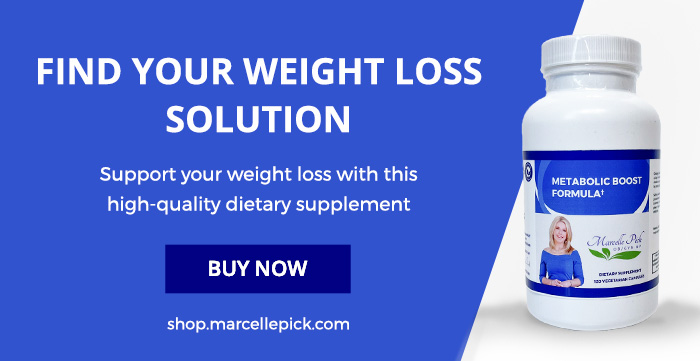Weight is a huge issue for women, especially in the United States where our culture holds up an unrealistic “ideal” that is nearly impossible to achieve. We’re bombarded with magazine covers in supermarket checkout lines, on the news, and social media with new diets and exercise plans that will supposedly help us drop those pounds. But for so many women, it’s not as simple as eating or exercising a certain way. I have women in my clinic all the time who have tried every plan and are still struggling to lose weight. Convinced they are doing something wrong, they eat less and less, but still nothing works.
I understand how frustrating that is. There are so many factors that make it so difficult to reach weight loss goals no matter what you try. People don’t talk enough about toxicity and weight loss, but I think they should! Your body is bombarded with toxins every day – in the air you breathe, the food you eat and water you drink, in your home and in stores — they’re unavoidable. But that doesn’t mean there’s nothing you can do about it. Knowing what you’re up against is the first step in finding natural ways to detoxify your body, reclaim your health, and lose those stubborn pounds! Let’s take a look at how toxins and weight loss are connected, and what you can do to clear out your system and reach your weight loss goals.
How Many Toxins is Your Body Holding on to?
Did you know that toxins can be stored in your fat cells, interfering with hormone receptors to block the important messages that hormones carry to your cells? Exposure to potentially harmful chemicals is so widespread that the Centers for Disease Control and Prevention’s most recent National Report on Human Exposure to Environmental Chemicals shows that scientists found that almost every person tested had several chemicals in their urine and/or tissues. Those chemicals included things like flame retardants and BPA.
Even more alarming is the 2009 report by the Environmental Working Group (EWG) that in ten minority newborn infants tested, each contained more than 200 chemicals in their cord blood. While this study was very small, and more research is clearly needed, it’s terrifying that babies are being born exposed to so many pollutants.
Research has also demonstrated that persistent organic pollutants are stored in adipose tissue (AT), which plays a role in regulating metabolism, storing energy, and endocrine function, among other vital physiological functions. While this storage is protective in some ways, keeping these POPs out of the bloodstream and safeguarding more sensitive tissues, it also means you may have constant low-level exposure to POPs. This ongoing exposure can contribute to inflammation and disruption of metabolism.
I don’t think that storing any man-made chemicals in our bodies is a good thing. And while you can’t control what’s in the air you are breathing, there are plenty of things you can do to minimize your exposure to these chemicals and keep them out of your tissues. Let’s take a look at where these toxins may be coming from, and then we’ll talk about how to avoid exposure and safely rid your body of these harmful substances.
Do You Know How Many Common Toxins You Are Exposed to Daily?
Providing important information to people is one of my primary goals as a healthcare professional. Conventional medicine often ignores the root cause and jumps straight to treatment of symptoms – usually with prescriptions. As a functional medicine practitioner, I think that approach misses the mark. You can’t do anything about a problem you aren’t aware of! So let’s look at some common categories of things that you may have never considered dangerous.
I believe that anything that contributes to disease should be considered a toxin. By that definition, it would be impossible to list all toxins. That’s partly because what is toxic for one person may be perfectly safe for another. We all have our own unique biochemistry, and broad generalizations simply don’t work well.
I have a detailed list of common toxins, laid out in broad categories, on my website. We’re going to take a look at a few of them here, but if you have persistent symptoms that no one can explain, it’s worth taking a look at the complete list to see if you can identify things that might be bothering you.
Heavy Metals
Certainly you’ve heard the concerns about lead and mercury. Awareness on these two heavy metals has come a long way, but it’s still important to mention, because exposure to these goes far beyond paint in older buildings or eating too much tuna. Did you know that toxic heavy metals can be found in amalgam tooth fillings, the pans you cook in, tap water, immunizations, and your favorite personal care products? That’s why it’s so important to read labels and know safer alternatives.
Beauty Products
There is so much pressure for women to look immaculate 24/7 that many of the women I come into contact with tell me they use multiple products on their skin daily. In fact, a survey of 2,300 people found that the average adult uses 9 personal care products each day – and these products contain 126 different chemical ingredients! That’s a lot of chemicals being absorbed into your body.
Household Products
Your quest to keep your home clean and free of germs might be damaging your health, as many household cleaning products contain potent chemicals that you touch and breathe as you use them. And cleaning products aren’t the only thing to watch out for; cookware, carpets, food storage containers, and even your furniture can all contain chemicals that can contribute to health issues.
Environment
Toxins are all around you, and you probably don’t even think about it. Take jet fuel, for example. Most people never consider that they’re inhaling it with every breath they take outdoors. And people who grew up in the era of leaded gasoline may be hanging on to toxic build-up from long ago. It all adds up, placing a burden on your body – and your health. And while you can’t avoid these kinds of environmental toxins, just knowing about them can help you take steps to reduce that burden.
Food
The number of processed products that people consider food and consume regularly astounds me. I was raised on fresh, local foods and have continued to cook from scratch throughout my life. But while I can’t imagine eating packaged foods myself, I can understand the appeal they hold in this modern, stressed out life. But easy comes at a price — one I’m not willing to pay. My rule of thumb is if you can’t pronounce the ingredients on the label, you shouldn’t eat the product.
Toxin Build Up Can Put Your Body on High Alert
Okay, so now you know just how many toxins you’re up against every single day. But why am I calling these things toxins? And what happens in your body when they build up in your tissues?
Remember how I said that I consider anything that makes you feel ill to be a toxin? What that means is almost anything can be considered a toxin for some people – particularly these man made chemicals that our bodies were never meant to handle. For some people who have sensitivity to specific chemicals, that toxic burden really takes a toll. And when you’re constantly exposed to things you can’t see or smell, you might not have any idea what that toll is until your body reaches its breaking point. That’s why some people can tolerate years of exposure, then suddenly find themselves unable to tolerate even the tiniest bit of something.
Your body has a natural detoxification process, but the build up of toxins in your tissues can create a clog – kind of like when your plumbing has more than it can handle and backs up. When that happens, those elimination systems break down, and that’s when you may need some help flushing out those toxins.
Toxins and Weight Loss – What’s the Connection?
The chemicals your body is handling often interfere with processes like balancing blood sugar and metabolizing cholesterol. When your body can’t function as nature intended, your hormones aren’t able to carry their important messages to your cells. Some hormones, in particular, can help or hinder your bodies ability to lose weight.
Healthy levels of T3, insulin and Leptin all have an impact on weight loss. All of the toxins we’ve discussed can create imbalances in these important hormones, making weight loss difficult. That’s because these toxins interfere with the signals your brain is receiving. For instance, if your brain doesn’t receive the message to burn fat for energy from leptin, your body will instead hold on to that fat.
And years of storing toxins in your tissues means you may notice this problem more as you age. That’s why so many women in perimenopause and menopause are struggling with trying to lose weight.
Related article: The Truth About Perimenopause Weight Gain
5 Tips for Eliminating Toxic Build Up
The good news is that something can be done. While you won’t be able to avoid all toxins, there are plenty of steps you can take to ease that toxic burden. Let’s look at a few of those now.
1. Be Selective in What You Are Eating
Food is the best medicine we have, and what you put into your body is entirely up to you. Choosing locally sourced, organic, whole foods is one of the easiest ways to limit unwanted toxins like pesticides. I know that the cost and availability can be limiting for some, so you may need to make choices about which foods are most important to eat organic. The EWG’s “dirty dozen” and “clean 15” lists are a great place to start. Remember, whole foods are always better than processed foods, and the more hard-to-pronounce ingredients packaged food has, the more likely it is that you’ll be exposed to things your body can’t tolerate. Don’t forget that drinking water – preferably filtered water – is a great way to help eliminate toxins as well. You should try to drink at least eight 8-ounce glasses per day.
2. Choose Personal Care Products Carefully
Skin care products, shampoos, and cosmetics can be very important to how women look and feel about themselves. But if the products you’re using to feel great leave you feeling lousy instead, you’re defeating the purpose. Just like with food, I urge you to read labels and choose natural products whenever possible. The EWG’s Skin Deep cosmetic database is a great source of information.
3. Build Personal Environmental Awareness
Sometimes, I’ll walk into a store and have to immediately turn around and walk out. If you find yourself getting an instant headache while shopping, it’s likely that something in the air is toxic to your body. Being conscientious about knowing what you are exposed to – particularly in places like your home which you can control more easily – can go a long way toward minimizing exposure. Check your home and work environments for potential mold and pay attention to how you feel in a place with wifi.
4. Don’t Forget to Move and Breathe
It’s so easy to ditch exercise and other self-care routines when you are feeling lousy and frustrated. If you’ve been stepping up your workouts to speed weight loss but end up stalled, it can be even more difficult to keep at it. But here’s the thing — you don’t have to work out more, you just have to keep yourself active. Try short bursts of activity, but try to work up a sweat since perspiration helps rid your body of toxins. And don’t forget to breathe from your belly several times each day. Shallow breathing doesn’t get the oxygen to all the systems in your body that rely on it to function properly.
5. Support Your Body Through Detoxification
Yes, your body has a natural detox system, but sometimes it needs a little extra help. Many of my patients have had great success using my two-week Quick Cleanse protocol. There are many elements to this cleanse routine, but one of the most important is giving your body the right nutrient support. That includes a high-quality multivitamin with calcium, magnesium, and at least 500 mg of vitamin C, an essential fatty acids supplement, extra fiber (ground flax seeds are a great option), and a good probiotic to support gut health.
Avoid Detox Pitfalls
It’s critical that you understand that gentle detoxification is the way to go. Harsh programs and detox products can be dangerous, and leave you more ill than when you began. I suggest working with a health care professional to discover what your personal needs are. It’s also worth noting that sometimes, you can feel worse before you feel better. That’s because the toxins are exiting your tissues, and they have to go somewhere before they’re expelled from your body. With the right support, you can work through this minor setback to meet your goals.
Get Rid of Toxins – and Those Extra Pounds
Toxins and weight loss are intricately connected. Once you understand how you can take the necessary steps to clean out your system and begin dropping pounds again. And the benefits don’t stop there; flushing out your internal “pipes” can make you feel better in so many ways. After years of toxic build-up, you probably don’t even know how good you can feel — isn’t it time you found out?
References:
http://drhyman.com/blog/2012/02/20/how-toxins-make-you-fat-4-steps-to-get-rid-of-toxic-weight/








